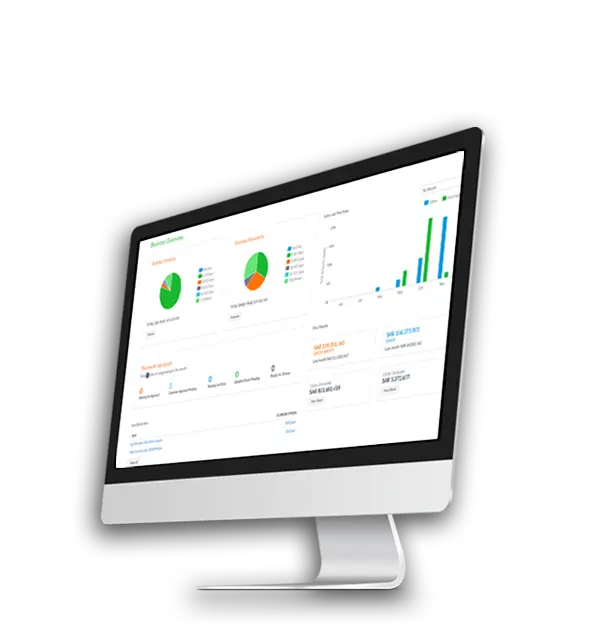

"The Importance of Software in Achieving Business Accuracy" suggests that accounting software plays a crucial role in ensuring that businesses can achieve accurate results. With the help of accounting software, businesses can automate their processes, collect data, analyze it, and make informed decisions based on that data.
In today's world, where businesses face tough competition, it has become essential to maintain a high level of accuracy in all their operations. From accounting to inventory management, from customer relationship management to sales forecasting, businesses need to rely on accurate data to make informed decisions.
Software tools like enterprise resource planning (ERP) systems, customer relationship management (CRM) software, and data analytics tools can help businesses achieve this accuracy. These tools can automate processes, eliminate errors due to human intervention, and provide real-time data that decision-makers can rely on.
By leveraging the power of accounting software, businesses can achieve accuracy in their operations, which can lead to increased efficiency, improved customer satisfaction, and better decision-making. The title "The Importance of Software in Achieving Business Accuracy" highlights the crucial role that software plays in ensuring business success.
Accounting Software has revolutionized the way businesses operate, making it easier to automate processes and collect data, which can be analyzed to make informed decisions. The accuracy of this data is critical to the success of the business. It is only by relying on accurate data that businesses can make informed decisions, mitigate risks, and take advantage of opportunities.
Accounting Software tools such as ERP systems can help businesses achieve accuracy in their accounting, inventory management, and other operations. These tools can automate processes, eliminating errors and reducing the time taken to complete tasks. By automating these processes, businesses can ensure that data is collected in real-time, making it easier to track inventory levels, sales data, and other critical information.
Customer relationship management (CRM) software is another essential tool that businesses can use to achieve accuracy. By using CRM software, businesses can collect data on customer interactions, track customer behavior, and provide personalized experiences to customers. This data can help businesses make informed decisions about their marketing strategies and product offerings.
Data analytics tools can also help businesses achieve accuracy by analyzing large datasets to identify patterns and trends. These tools can help businesses make data-driven decisions, allowing them to optimize their operations, improve their marketing strategies, and reduce costs.
In conclusion, the title "The Importance of Software in Achieving Business Accuracy" highlights the crucial role that accounting software plays in ensuring the success of modern businesses. By leveraging software tools, businesses can automate processes, collect accurate data, and make informed decisions based on that data. In today's competitive business environment, accuracy is critical, and accounting software is a key enabler in achieving that accuracy.
The importance of software in achieving business accuracy cannot be overstated. In today's fast-paced and competitive business environment, it is essential to have accurate data to make informed decisions. Inaccurate data can lead to poor decision-making, which can have significant consequences for the business. This is where software comes in, as it helps businesses automate processes, collect accurate data, and make informed decisions based on that data.
Accounting Software tools like ERP systems, CRM software, and data analytics tools are designed to improve accuracy and efficiency in business operations. ERP systems, for example, can automate processes like inventory management, reducing the likelihood of errors and increasing efficiency. This automation also ensures that data is collected in real-time, providing decision-makers with up-to-date information.
CRM software, on the other hand, can help businesses collect accurate data on customer interactions, which can be used to personalize customer experiences and optimize marketing strategies. This data can also help businesses identify areas for improvement in their customer service, leading to increased customer satisfaction and loyalty.
Data analytics tools are another important software tool that businesses can use to achieve accuracy. These tools can analyze large datasets to identify patterns and trends, which can be used to make data-driven decisions. For example, businesses can use data analytics tools to analyze sales data and identify the best-selling products, allowing them to optimize their inventory management and improve their profitability.
In conclusion, accounting software plays a critical role in achieving business accuracy. By automating processes, collecting accurate data, and providing decision-makers with up-to-date information, software tools can help businesses make informed decisions and stay ahead of the competition.
Accounting Software has become an integral part of modern businesses. It helps to streamline operations, automate processes, and collect data, which is essential for making informed decisions. Accuracy is critical in this data-driven world, and software tools can help businesses achieve this accuracy.
ERP systems are a type of accounting software that integrates various business functions, including accounting, inventory management, and human resources. These systems can automate processes and provide real-time data, improving accuracy and efficiency. For example, an ERP system can track inventory levels, identify slow-moving items, and help businesses make better purchasing decisions.
CRM software is another critical tool that businesses can use to achieve accuracy. This accounting software can collect data on customer interactions, including purchase history, preferences, and feedback. This data can be used to personalize marketing strategies, improve customer service, and retain customers.
Data analytics tools are designed to analyze large datasets, identify trends and patterns, and provide insights. These tools can help businesses make data-driven decisions, improve operations, and increase profitability. For example, a business can use data analytics tools to identify the most profitable product lines and focus on these to improve profitability.
Finally, accounting software can help businesses achieve accuracy in compliance and risk management. Compliance with regulations is essential for businesses, and software can help them ensure that they are meeting all the required standards. For example, software can help businesses track compliance with data protection regulations, reducing the risk of data breaches.
In conclusion, software has become a critical component of modern businesses, helping them achieve accuracy in their operations, improve decision-making, and increase profitability. By leveraging the power of software tools like ERP systems, CRM software, and data analytics tools, businesses can stay ahead of the competition and achieve success in today's fast-paced business environment.